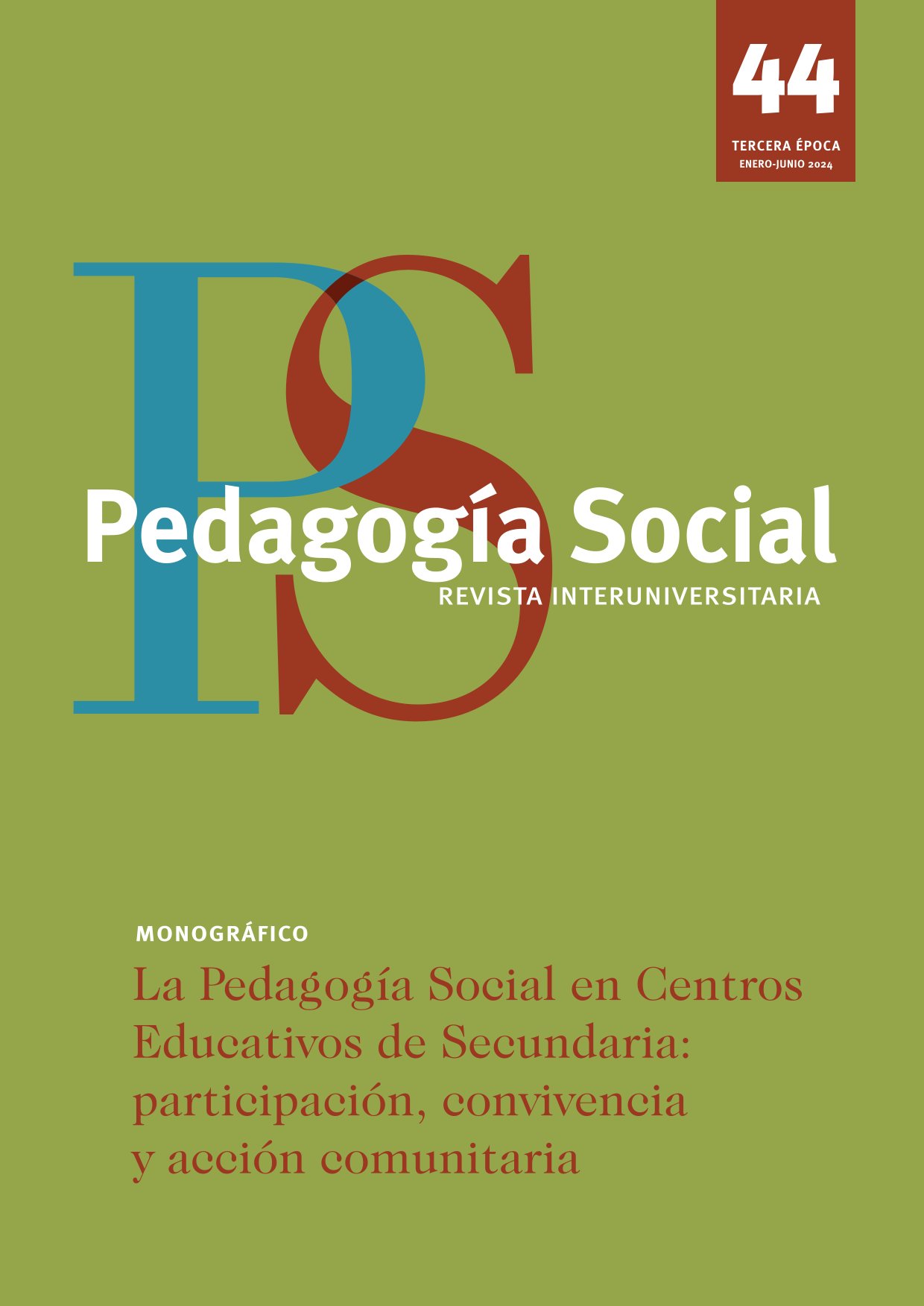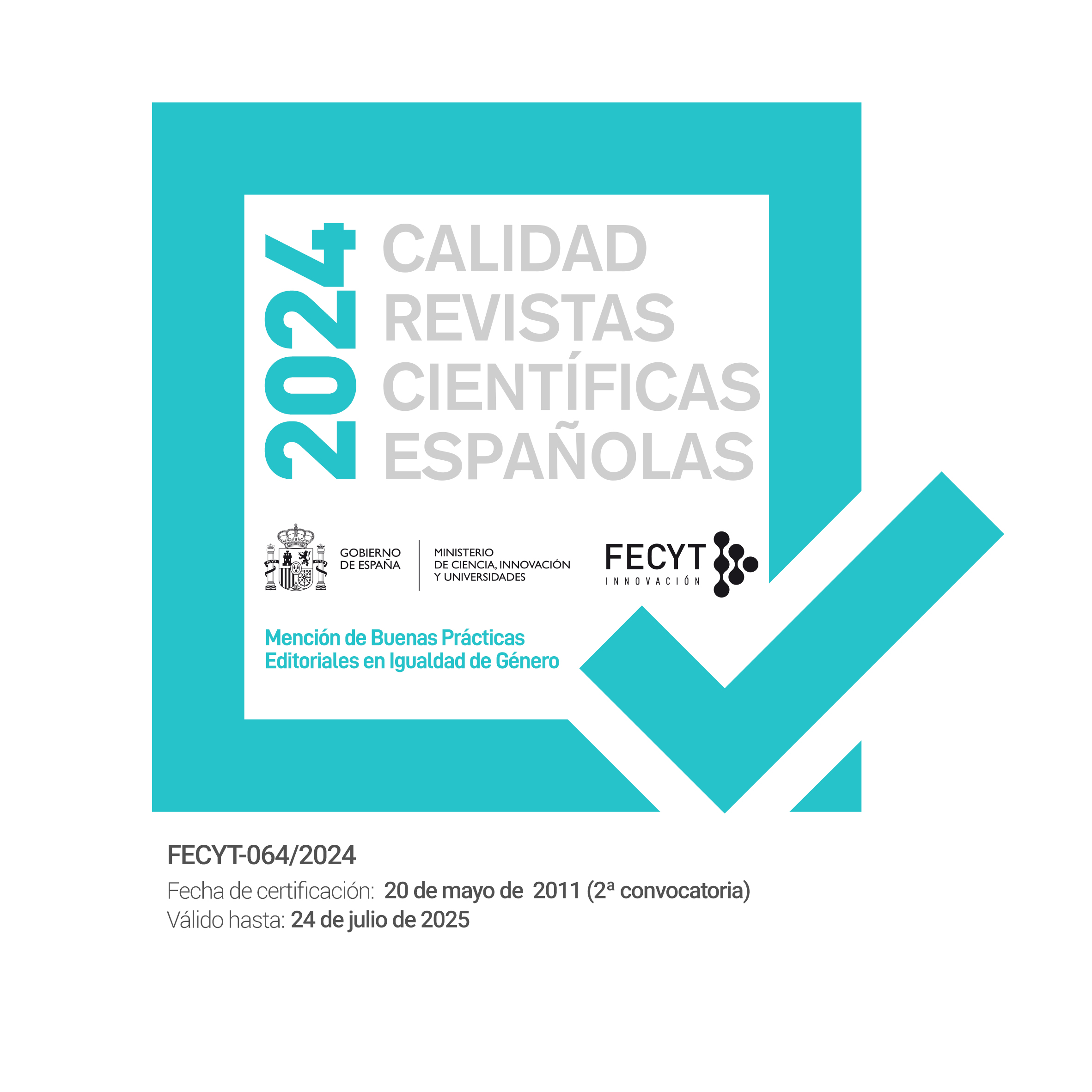Estresse migráfico e bem-estar subjetivo em menores migrantes desacompanhados
DOI:
https://doi.org/10.7179/PSRI_2024.44.11Palavras-chave:
Menores migrantes desacompanhados, bem-estar subjetivo, estresse do imigrante, sistema de proteção infantilResumo
Os migrantes menores desacompanhados (MMNA) representam um grupo que partilha o estatuto de imigrante e menor, estando exposto a múltiplos estressores que dificultam a sua integração no país de acolhimento. Além disso, a sua chegada em vagas gera uma enorme pressão sobre o Sistema de Proteção à Criança, que muitas vezes se vê obrigado a centrar-se na cobertura das necessidades mais básicas, ficando impossibilitado de atender a outras necessidades igualmente importantes. O objetivo deste trabalho é conhecer os níveis de bem-estar e estresse migratório sofridos pelo MMNA, bem como os fatores que afetam ambas as variáveis. 44 MMNA completou o Índice de Bem-Estar Pessoal (PWI) e a Escala de Estresse do Imigrante de Barcelona (BISS). Os resultados indicam que os MMNA sofrem stress migratório, sobretudo stress intercultural, e que os seus níveis de bem-estar são inferiores ao resto dos adolescentes. Ambas as variáveis estão intimamente relacionadas, uma vez que altos níveis de estresse estão associados a uma diminuição do bem-estar. Variáveis como a situação familiar, o tempo de permanência, a documentação em ordem e o treinamento se mostram essenciais para melhorar o bem-estar e reduzir o estresse migratório. Esses resultados são interpretados e discutidos em relação a pesquisas anteriores e propostas de intervenção com esse grupo.
Downloads
Referências
Ato, M. y Vallejo, G. (2015). Diseños de investigación en psicología. Pirámide.
Bravo, A., Martín, E. y Del Valle, J. F. (2023). The changing character of residential care for children and youth in Spain. En J. Whittaker, L. Holmes, J. F. Del Valle y S. James (eds.), Revitalizing residential care for children and youth: cross-national trends and challenges (pp. 179-192). Oxford University Press.
Bravo, A. y Santos, I. (2017). Menores extranjeros no acompañados en España: necesidades y modelos de intervención [Asylum-seeking children in Spain: Needs and intervention models]. Psychosocial Intervention, 26(1), 55-62. https://doi.org/10.1016/j.psi.2015.12.001
Butterworth, S., Singh, S. P., Birchwood, M., Islam, Z., Munro, E., Vostanis, P., …Simkiss, D. (2017). Transitioning care-leavers with mental health needs: ‘they set you up to fail!’ Child and Adolescent Mental Health 22, 138–147. https://doi.org/10.1111/camh.12171
Campbell, A., Converse, P. E. y Rodgers, W. L. (1976). The quality of American life: Perceptions, evaluations, and satisfactions. Russell Sage Foundation.
Casas, F., Bello, A., González, M. y Aligué, M. (2013). Children’s subjective well-being measured using a composite index: what impacts Spanish first-year secondary education students’ subjective well-being? Child Indicators Research, 6(3), 433–460. https://doi.org/10.1007/s12187-013-9182-x
Collazos, F., Qureshi, A., Antonín, M. y Tomás-Sábato, J. (2008). Estrés aculturativo y salud mental en la población inmigrante [Acculturative stress and mental health in the inmigrant population]. Papeles del Psicólogo, 29(3), 307-315.
Cummins, R. A. y Lau, A. L. (2005). Personal wellbeing index – School children. Manual (3rd ed., pp. 74-93). School of Psychology, Deakin University.
Devenney, K. (2020). ‘My own blood’: family relationships of unaccompanied asylum-seeking young people in the UK. Families, Relationships and Societies, 9(2), 183-199. https://doi.org/10.1332/204674318X15394355767055
Fernández-Simo, D., Carrera-Fernández, M. V., Cid-Fernández, X. M. y Correia, E. (2023). Effective strategies for socio-educational intervention during the process of transition to adult life of unaccompanied minors from Africa. Child and Family Social Work, 28(2), 311-320. https://doi.org/10.1111/cfs.12963
Frounfelker, R. L., Miconi, D., Farrar, J., Brooks, M. A., Rousseau, C. y Betancourt, T. S. (2020). Mental health of refugee children and youth: epidemiology, interventions, and future directions. Annual Review of Public Health, 41, 159-176. https://doi.org/10.1146/annurev-publhealth-040119-094230
Gladwell, C. (2021). The impact of educational achievement on the integration and wellbeing of Afghan refugee youth in the UK. Journal of Ethnic and Migration Studies, 47(21), 4914-4936. https://doi.org/10.1080/1369183X.2020.1724424
González-García, C., Águila-Otero, A., Montserrat, C., Lázaro, S., Martín, E., Del Valle, J. F. y Bravo, A. (2022). Subjective well-being of young people in therapeutic residential care from a gender perspective. Child Indicators Research, 15(1), 249-262. https://doi.org/10.1007/s12187-021-09870-9
Gullo, F., García-Alba, L., Bravo, A. y Del Valle, J. F. (2021). Crossing countries and crossing ages: The difficult transition to adulthood of unaccompanied migrant care leavers. International Journal of Environmental Research and Public Health, 18, 6935. https://doi.org/10.3390/ijerph18136935
Herrera-Pastor, D., Ruiz-Román, C., Bernedo-Muñoz, I. y Crecente-Dopena, M. (2022). Acompañamiento socioeduca-tivo y resiliencia en jóvenes migrantes extutelados: una aproximación desde las oportunidades, los sueños y los apoyos [Socio-educational accompaniment and resilience in exprotected young migrants: an approach base don opportunities, dreams and supports] Pedagogía Social. Revista Interuniversitaria, 41, 15-27. https://doi.org/10.7179/PSRI_2022.41.01
Hodges, M., Vasquez, M. M., Anagnostopoulos, D., Trianafyllou, K., Abdelhady, D., Weiss, K., Koposov, R., Cuhadaroglu, F., Hebebrand, J. y Skokauskas, N. (2018). Refugees in Europe: national overviews from key countries with a special focus on child and adolescent mental health. European Child and Adolescent Psychiatry, 27, 389-399. https://doi.org/10.1007/s00787-017-1094-8
Inofuentes, R. A., De la Fuente, L., Ortega, E. y García-García, J. (2022). Victimización y problemas de conducta exter-nalizante y antisocial en menores extranjeros no acompañados en Europa: Revisión sistemática [Victimization and externalizing and antisocial behavior problems in unaccompanied foreign minors in Europe: Systematic review]. Anuario de Psicología Jurídica, 32, 95-106. https://doi.org/10.5093/apj2021a24
IOM (2021). Global migration indicators 2021. International Organization for Migration.
Ivert, A. K. y Magnusson, M. M. (2020). Drug use and criminality among unaccompanied refugee minors: a review of the literature. International Journal of Migration, Health and Social Care, 16(1), 93-107. https://doi.org/10.1108/IJMHSC-05-2019-0050
Kauhanen, I. y Kaukko, M. (2020). Recognition in the lives of unaccompanied children and youth: a review of key European literature. Child and Family Social Work, 25(4), 875-883. https://doi.org/10.1111/cfs.12772
Kauhanen, I., Kaukko, M. y Lanas, M. (2022). Pockets of love. Unaccompanied children in institutional care in Finland. Children and Youth Services Review. https://doi.org/10.1016/j.childyouth.2022.106621
Kien, C., Sommer, I., Faustmann, A., Gibson, L., Schneider, M., Krczal, E., Jank, R., Klerings, I., Szelag, M, Kerschner, B., Brattström, P. y Gatlehner, G. (2019). Prevalence of mental disorders in young refugees and asylum seekers in European Countries: a systematic review. European Child and Adolescent Psychiatry, 28, 1295-1310. https://doi.org/10.1007/s00787-018-1215-z
King, D. y Said, G. (2019). Working with unaccompanied asylum-seeking young people: cultural considerations and ac-ceptability of a cognitive behavioural group approach. Cognitive Behaviour Therapist, 12, e12. https://doi.org/10.1017/S1754470X18000260
Lau, A. L. D., Cummins, R. A. y McPherson, W. (2005). An investigation into the cross-cultural equivalence of the personal wellbeing index. Social Indicators Research, 72, 403-430. https://doi.org/10.1007/s11205-004-0561-z
Llosada-Gistau, J., Casas, F. y Montserrat, C. (2017). What matters in for the subjective Well-Being of children in care? Child Indicators Research, 10(3), 735–760. https://doi.org/10.1007/s12187-016-9405-z
Llosada-Gistau, J., Montserrat, C. y Casas, F. (2015). The subjective well-being of adolescents in residential care com-pared to that of the general population. Children and Youth Services Review, 52, 150-157. https://doi.org/10.1016/j.childyouth.2014.11.007
López-Martín, E. y Ardura-Martínez, D. (2023). El tamaño del efecto en la publicación científica [The effect size in scien-tific publication]. Educación XX1, 26(1), 9-17. https://doi.org/10.5944/educxx1.36276
Luceño-Moreno, L., Anghel, A. G., Brabete, A. y Martín-García, J. (2020). The relationship between the process of acculturation and the perception of psychosocial risk in the workplace. Ansiedad y Estrés, 26(2-3), https://doi.or-g/10.1016/j.anyes.2020.02.002
Martín, E., González-Navasa, P. y Betancort, M. (2020). Who will go back home? Factor associated with decisions to address family reunification from residential care. Children and Youth Services Review, 109, 104729. https://dx.doi.org/10.1016/j.childyouth.2019.104729
Martín, E., González-Navasa, P., Chirino, E. y Castro, J. J. (2020). Social Inclusion and life satisfaction of care leavers. Pedagogía Social. Revista Interuniversitaria, 35, 101-111. https://doi.org/10.7179/PSRI_2020.35.08
Mateos-Rodríguez, I. y Dobler, V. (2021). Survivors of hell: resilience amongst unaccompanied minor refugees and im-plications for treatment: a narrative review. Journal of Child and Adolescent Trauma, 14(4), 559-569. https://doi.org/10.1007/s40653-021-00385-7
Melkman, P. (2017). Childhood adversity, social support networks and well-being among youth aging out of care: an exploratory study of mediation. Child Abuse and Neglect, 72, 85-97. https://doi.org/j.chiabu.2017.07.020.
Müller, L.R.F., Büter, K. P., Rosner, R. y Unterhitzenberger, J. (2019). Mental health and associated stress factors in accompanied and unaccompanied refugee minors resettled in Germany: a cross-sectional study. Child and Adoles-cent Psychiatry and Mental Health, 13, article number 8. https://doi.org/10.1186/s13034-019-0268-1
Observatorio de la Infancia (2021). Boletín de datos estadísticos de medidas de protección a la infancia, (número 23). Ministerio de Derechos Sociales y Agenda 2030.
Ochoa de Alda, I., Antón, J., Rodríguez, A. y Atabi, H. (2009). La importancia del trabajo con la familia en la atención a menores extranjeros no acompañados. Un estudio piloto [The importance of working with the family in the care of unaccompanied foreign minors. A pilot study]. Apuntes de Psicología, 27(2–3), 427–439.
Oppedal, B., Ramberg, V. y Røysamb, E. (2020). The asylum-process, bicultural identity and depression among unac-companied young refugees. Journal of Adolescence, 85, 59-69. https://doi.org/10.1016/j.adolescence.2020.07.007
Quiroga, V. (2009). Menores migrantes no acompañados: nuevos perfiles, nuevas necesidades. En la Calle: Revista sobre Situaciones de Riesgo Social, 14, 8-14.
Revollo, H. W., Qureshi, A., Collazos, F., Valero, S. y Casas, M. (2011). Acculturative stress as a risk factor of depression and anxiety in the Latin American inmigrant population. International Review of Psychiatry, 23(1), 84-92. https://doi.org/10.3109/09540261.2010.545988
Tomás-Sábato, J., Antonin, M., Querashi, A. y Collazos, F. (2007). Construction and preliminary validation of the Barcelona Immigration Stress Scale. Psychological Reports, 100, 1013-1023.
UNICEF (2021). Canarias: niños y niñas migrantes en una de las rutas más peligrosas del mundo. UNICEF España.
Van Os, E. C. C., Kalverboer, M. E., Zijlstra, A. E., Post, W. J. y Knorth, E. J. (2016). Knowledge of the unknown child: A systematic review of the elements of the best interests of the child assessment for recently arrived refugee children. Clinical Child and Family Psychology Review, 19(3), 185-203. https://doi.org/10.1007/s10567-016-0209-y
WHO (2022). World mental health report. Transforming mental health for all. World Health Organization.
Zijlstra, A. E., Menninga, M. C., Van Os, E. C. C., Rip, J. A., Knorth, E. J. y Kalverboer, M. E. (2019). ‘There is No Mother to Take Care of You’. Views of Unaccompanied Children on Healthcare, Their Mental Health and Rearing Environment. Residential Treatment for Children and Youth, 36(2), 118-136. https://doi.org/10.1080/0886571X.2018.1559118
Publicado
Como Citar
Edição
Secção
Licença

Este trabalho encontra-se publicado com a Licença Internacional Creative Commons Atribuição-NãoComercial-CompartilhaIgual 4.0.
Derechos de reproducción y archivo
La versión publicada de los artículos podrá ser autoarchivada por sus autores en repositorios institucionales y temáticos de acceso abierto. No obstante la reutilización total o parcial de los mismos en nuevos trabajos o publicaciones deberá ser autorizada por Pedagogía Social. Revista Interuniversitaria.
Los trabajos publicados deberán ser citados incluyendo el título de la Revista, Pedagogía Social. Revista Interuniversitaria, nº, páginas y año de publicación.
Responsabilidades éticas
Pedagogía Social. Revista Interuniversitaria no acepta material publicado anteriormente en otros documentos. Los/as autores/as son responsables de obtener los permisos oportunos para reproducir parcialmente material de otras publicaciones y citar correctamente su procedencia. Estos permisos deben solicitarse tanto al autor/a como a la editorial que ha publicado dicho material.
Es obligación de Pedagogía Social. Revista Interuniversitaria detectar y denunciar prácticas fraudulentas.
En la lista de autores/as firmantes deben figurar únicamente aquellas personas que han contribuido intelectualmente al desarrollo del trabajo.
La revista espera que los/as autores/as declaren cualquier asociación comercial que pueda suponer un conflicto de intereses en conexión con el artículo remitido.
Los autores deben mencionar en el manuscrito, preferentemente en el apartado del método, que los procedimientos utilizados en los muestreos y controles han sido realizados tras la obtención de consentimiento informado.
La revista no utilizará ninguno de los trabajos recibidos con otro fin que no sea el de los objetivos descritos en estas normas.
Aviso de derechos de autor/a
© Pedagogía Social. Revista Interuniversitaria. Los originales publicados en las ediciones impresa y electrónica de esta Revista son propiedad del Pedagogía Social. Revista Interuniversitaria, siendo necesario citar la procedencia en cualquier reproducción parcial o total.
Salvo indicación contraria, todos los contenidos de la edición electrónica se distribuyen bajo una licencia de uso y distribución “Creative Commons Reconocimiento-No Comercial 3.0 España” (CC-by-nc). Puede consultar desde aquí la versión informativa y el texto legal de la licencia. Esta circunstancia ha de hacerse constar expresamente de esta forma cuando sea necesario.






